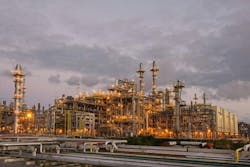Petrobras proceeding with upgrading, expansion works at RNEST refinery
Petróleo Brasileiro SA (Petrobras) has formally resumed its investment program for the long-planned expansion and upgrade of its Refinaria Abreu e Lima (RNEST) refinery in Ipojuca, Pernambuco, in northeast Brazil, that will double the site’s overall nameplate capacity to process crude oil (OGJ Online, June 29, 2023).
With a Jan. 18 ceremony to mark official relaunch, the RNEST investment program will add a second 130,000-b/d processing train at the original 130,000-b/d single-train refinery to boost total processing capacity to 260,000 b/d upon completion in 2028, Petrobras said.
Included as part of Petrobras’s 2024-28+ strategic plan and the Brazilian federal government’s New Growth Acceleration Program (PAC), RNEST’s Train 2 project is in the contracting phase, with construction works scheduled to begin during second-half 2024, according to the operator.
As part of the investment plan, Petrobras said it also has undertaken construction of a sulfur-emissions reduction unit based on Topsoe AS’s proprietary SNOx technology that, once completed, will convert sulfur oxide (SOx) and nitrogen oxide (NOx) into a new product for commercialization.
While Petrobras disclosed neither the capacity nor type of commercial production anticipated from the proposed unit, the SNOx unit seemingly will be equipped with a processing capacity of 15,000 b/d, according to the company’s strategic plan released on Nov. 27, 2023.
RNEST’s originally planned but subsequently delayed SNOx unit was to treat up to 650,000 cu m of flue gas and produce as much as 750,000 tonnes/day of sulfuric acid (OGJ Online, Mar. 13, 2015).
With construction under way on the refinery’s revived SNOx project, Petrobras said the new unit—which, upon startup, will become the first of its kind in the Brazilian refining sector—is scheduled to enter operation sometime this year.
Petrobras said it is also proceeding this year with RNEST’s Train 1 revamp, which will include works to improve operations of the existing atmospheric distillation unit, delayed coker, and other unidentified auxiliary units that, together, will return the processing train to its 130,000-b/d designed capacity, as well as increase its yield of light products and ability to process crude from Brazil’s offshore presalt formation (OGJ Online, Apr. 21, 2023).
Combined, RNEST’s expansion and modernization—once completed—also will enable Petrobras to increase its supply of high-demand low-carbon products, including 13 million l./day of 100% low-sulfur S-10 diesel (10 ppm sulfur) diesel.
In addition to reducing emissions of particulate matter, S-10 diesel—which has a higher cetane number than S-500 diesel (500 ppm sulfur)—promotes improved fuel performance of vehicle engines in line with Brazil’s stricter air pollution control program for on-road heavy-duty and utility vehicles.
About the Author
Robert Brelsford
Downstream Editor
Robert Brelsford joined Oil & Gas Journal in October 2013 as downstream technology editor after 8 years as a crude oil price and news reporter on spot crude transactions at the US Gulf Coast, West Coast, Canadian, and Latin American markets. He holds a BA (2000) in English from Rice University and an MS (2003) in education and social policy from Northwestern University.

